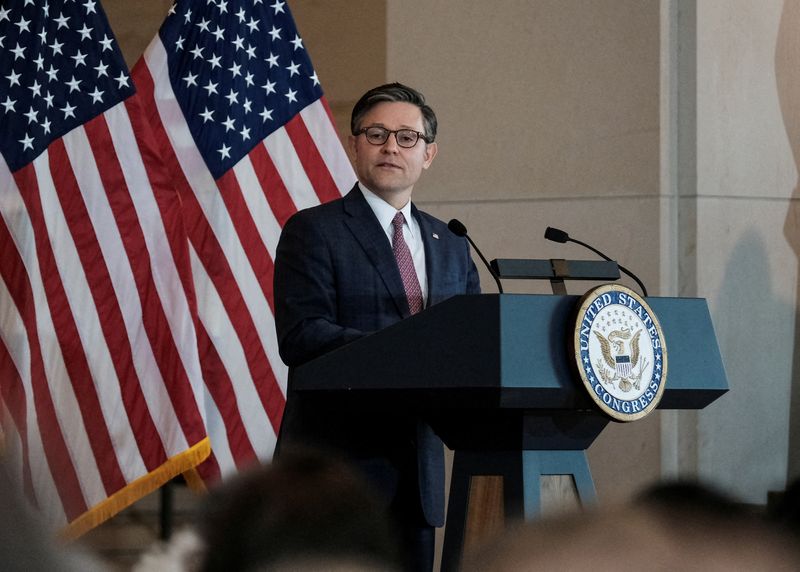By Raphael Satter and Christopher Bing
WASHINGTON (Reuters) – U.S. Home of Representatives Speaker Mike Johnson has failed three instances in the previous five months to reauthorize a provision of a key thought vitality recognized as Allotment 702, with lawmakers citing reservations over how the authority empowers warrantless domestic surveillance.
Right here’s a gape at what Allotment 702 does, why so many legislators favor it changed, and what happens if it expires.
WHAT IS SECTION 702 AND WHAT DOES IT DO?
Allotment 702 of the International Intelligence Surveillance Act, or FISA, is one of a series of authorizations handed after the 11th of September, 2001, attacks that allow American thought agencies to surveil foreigners in one other country utilizing files drawn from U.S. digital infrastructure such as files superhighway carrier companies. The suggestions is normal to trace enemy spies, rogue hackers and extremist militants.
The suggestions gathered by the program, however, frequently entails communications to or from People, and also will seemingly be mined by domestic legislation enforcement our bodies such because the FBI without a warrant.
That notice has apprehensive libertarian and privacy-concious lawmakers – every Republicans and Democrats. Fresh revelations that the FBI normal this vitality to hunt for details about Murky Lives Subject protesters, congressional marketing campaign donors and U.S. lawmakers beget raised further doubts in regards to the program’s integrity.
WHAT DO REFORM ADVOCATES WANT?
Requiring a obtain’s signal-off on searches and surveillance is a key phase of how the U.S. preserves personal liberty from doable encroachment by yell vitality, acknowledged Jake Laperruque of the nonprofit, Washington-based mostly Center for Democracy and Technology. The usage of an espionage authority geared toward foreigners to short-circuit that map “upright goes against the basic precept of how we balance privacy and security in this country,” he acknowledged.
Overlapping congressional reform proposals would power the FBI and others to explore judicial authorization sooner than exploiting the files gathered by the enormous U.S. thought equipment. And whereas there are totally different proposed reforms – luxuriate in a ban on U.S. intelligence agencies circumventing constitutional protections by looking out for sensitive files on People from industrial files brokers – Democratic and Republican lawmakers alike beget made “bring collectively a warrant” their rallying direct.
“If the warrant requirement doesn’t plod in the legislation, I ain’t supporting it,” Republican hardline congressman Jim Jordan urged colleagues at a listening to in February.
Intelligence officials beget bristled on the foundation. Glenn Gerstell, a broken-down traditional counsel of the National Security Company, acknowledged the promoting campaign to require warrants was as soon as unsuitable and unhealthy.
“This is in a position to maybe well be devastating to our efforts to forestall worldwide drug trafficking, Chinese language espionage on American soil and Russian ransomware gangs concentrated on American companies,” he acknowledged.
Whatever its merits, Speaker Johnson, a Republican, has many instances sidelined efforts to carry the proposed reforms to a vote, as a substitute looking to push thru versions of the reauthorization invoice appreciated by the intelligence group.
WHAT HAPPENS IF THE PROVISION SIMPLY EXPIRES?
The President’s Intelligence Advisory Board has acknowledged letting 702 expire might maybe well be “one of the most worst intelligence failures of our time.” A wholesale scrapping of the authority appears to be like unlikely. Johnson has acknowledged “it be too essential to national security” to desert the reauthorization effort. Even critics of the invoice assuredly favor reforms somewhat than scrapping the authority altogether.
Laperruque agreed that Allotment 702 supplied charge to the intelligence group, nonetheless he cautioned that it wasn’t uncommon for officials to dial up the hysteria when Congress threatened to water down their surveillance powers.

“We seen that on the identical thing with the legislation that got pushed after the Snowden disclosures,” he acknowledged, referring to U.S. intelligence contractor Edward Snowden’s revelations that the National Security Company was as soon as secretly sweeping up hundreds of hundreds’ of People’ cell phone call files and mendacity about it. Outraged lawmakers moved to shut it down, handiest to be urged by the chief that “it be necessary, it be necessary, it might maybe well be a catastrophe for national security if we stopped the worldwide bulk series authority,” Laperruque acknowledged.
Congress pulled the recede on bulk series anyway, “and lo and explore the sky didn’t fall,” he acknowledged.
FBS International change Stock Bitcoin






